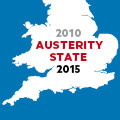Rutland council targets growth as well as savings

Roula Khalaf, Editor of the FT, selects her favourite stories in this weekly newsletter.
A world away from Oldham’s metropolitan challenges, Rutland, England’s smallest county, has gambled on growth.
The Conservative-run council has bought a riot-scarred prison and invested £3m turning it into a business park. Already at more than 96 per cent occupancy less than two years after opening, the council estimates it will eventually generate about £200,000 a year in rent and business rates, relieving some of the budgetary pressures and creating employment to bolster the local economy.
Many of the business units retain the original bars and doors while razor wire, largely removed, has been retained in one part of the prison for the delectation of film and television companies, which frequently visit.
Almost all the tenants unpromptedly credit the council’s efforts for their decision to locate here. Most crack jokes about the unrivalled security on offer.
The council, says chief executive Helen Briggs, is now focused on income generation as much as on finding cuts.
She cites its decision to step into the vacuum left by commercial providers, by investing £1.67m into ensuring the county has near-universal broadband coverage.
Interactive: Local cuts checker

Between 2009-10 and 2014-15, spending by England’s 300-plus local authorities was cut by a fifth — more than twice the rate of spending cuts to the rest of the UK public sector. Our Local Cuts Checker database brings together a myriad of data — most compiled by local councils themselves for the purposes of reporting to central government — to allow readers to explore the impact of those cuts in their areas.
Continue reading
Already it has seen evidence that local businesses are choosing to expand in Rutland rather than 50 miles away in Cambridge. “We have been very much driven towards trying to support our economy where we can,” says Terry King, deputy leader of Rutland county council.
Rutland exemplifies the trend among local authorities to share services with other authorities to reduce costs. Peterborough council, for example, provides both trading standards and legal services. Rutland, in turn, provides services for some of its neighbours.
By and large local people in this relatively affluent area have been realistic about the need for savings and happy to donate their own labour to keep services going.
Mr King says: “In nearly every instance where we’ve looked to reduce library opening hours, volunteers have stepped in . . . without a battle royal. The community’s worked with us on trying to solve those problems and recognise the issues.”
The council increasingly views the charitable sector as a key partner in delivering public services and has hired a network of salaried “community agents” to help co-ordinate provision and encourage voluntary effort.
A principal aim is to provide support to help people remain in their own homes, relieving pressure on both the NHS and adult social care budgets.
This is not, emphasises Ms Briggs, “about us trying to replace statutory functions with volunteers . . . It is about how we can use the voluntary and community sector [through] commissioning services from them. She adds, however, that there are “some things they will continue to do on a voluntary basis that will fit hand and glove with the services that they will be commissioned to provide by us”.
The community response is symbolised by what has happened in Ketton, where both the library and the GP surgery were threatened with closure. The solution, after a campaign by local people, was to bring them together in a single building.
Now a librarian and receptionist preside over their separate counters, dispensing prescriptions and books within 10 feet of one another.
Anne McQuistan, a local resident who set up the petition that helped to save both surgery and library, is delighted by the new arrangement, which she describes as “more friendly”. Ms McQuistan is clear that the budget cuts that have spawned it were needed. “We have to cut our coat to fit our cloth,” she says.



Comments